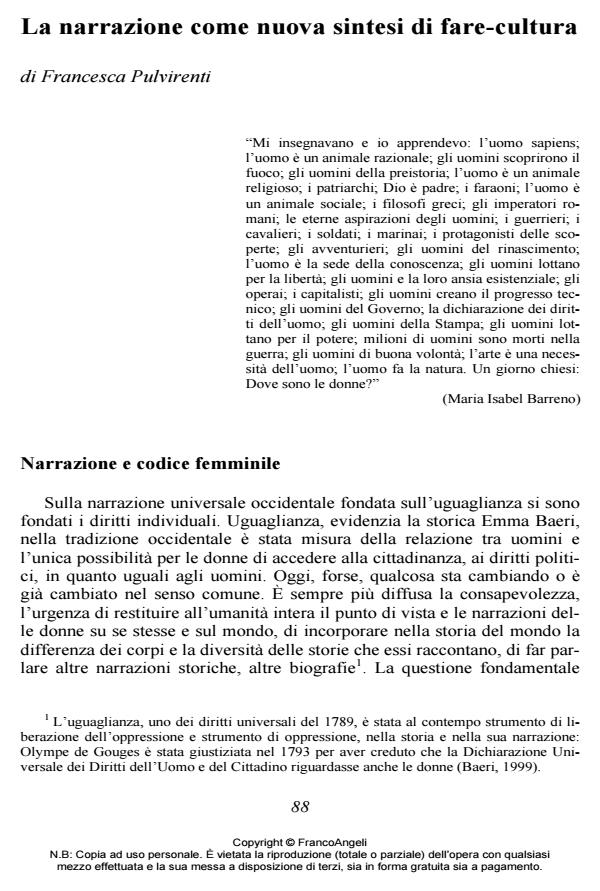La narrazione come nuova sintesi di fare-cultura
Titolo Rivista EDUCATIONAL REFLECTIVE PRACTICES
Autori/Curatori Francesca Pulvirenti
Anno di pubblicazione 2012 Fascicolo 2012/1
Lingua Italiano Numero pagine 11 P. 88-98 Dimensione file 336 KB
DOI 10.3280/ERP2012-001006
Il DOI è il codice a barre della proprietà intellettuale: per saperne di più
clicca qui
Qui sotto puoi vedere in anteprima la prima pagina di questo articolo.
Se questo articolo ti interessa, lo puoi acquistare (e scaricare in formato pdf) seguendo le facili indicazioni per acquistare il download credit. Acquista Download Credits per scaricare questo Articolo in formato PDF

FrancoAngeli è membro della Publishers International Linking Association, Inc (PILA)associazione indipendente e non profit per facilitare (attraverso i servizi tecnologici implementati da CrossRef.org) l’accesso degli studiosi ai contenuti digitali nelle pubblicazioni professionali e scientifiche
In this paper we outline the boundaries of a new epistemology in which female narration and code overlap with the role of narrativity and complexity in contemporary research, as Paradigms of Transversality. In postmodernity, narrativity emerges as the contextualization of knowledge and complexity utters itself as its current epistemic statute. Knowledges are located in the ‘living world’ and as such they should be understood narratively. Narrative, then, goes from being ‘external history’ to an increasingly ‘internal paradigm’ of knowledge, one that is always (and totally) intertwined with ‘narrative thinking’. Female knowledge finds its right place in this epistemic situation, and the epistemological and philosophical reflections - highlighted by the introduction of the category of gender - allow feminist discourse to state the systematic asymmetry between women and men; in effect, the latter, despite acting on all levels and in all moments of social and cultural life, has no ultimate foundational cause, since gender is a historical construct, and therefore modifiable. In this feminist path, narrative therefore presents itself as a declaration of existence, of being woman and being man, which rests on the cultural as well as the biological. Women and men make up a discursive intrigue, which is peripatetic and adventurous, an interdependent complexity. This narrative reveals our narrative webs and introduces us to an interactive universalism that sets the relational dimension as constitutive of individuals, groups, cultures and identities. The task of education thus is to open the road, through reflexive practices, to different ways of living, centred on personal experiences, and therefore narrative knowledge, in order to enable man and woman to learn to reveal themselves, to think and think of themselves, to tell and tell themselves, to insert themselves into networks of dialogue, so to build sites for innovation and reflexivity and open ‘thresholds’ and ‘meeting places’ to ‘do-culture’.
Francesca Pulvirenti, La narrazione come nuova sintesi di fare-cultura in "EDUCATIONAL REFLECTIVE PRACTICES" 1/2012, pp 88-98, DOI: 10.3280/ERP2012-001006